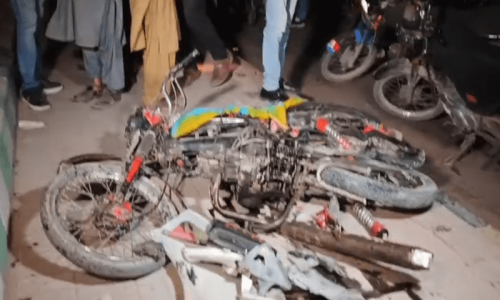KARACHI: From the main gate, vests, trousers and shalwars can be seen hanging on the first floor of the historic Mitha Ram Hostel building located near Pakistan Chowk. A a police van stands next to the building, with a charpoy on a side on which two Rangers personnel can be seen lying.
Just then, a Pakistan Rangers guard blocks the view, curtly declaring: “Photography and visitors are not allowed here.” When asked if an officer can be spoken to, the guard said there was no one present at the moment. A Rangers spokesperson did not answer phone calls when this writer tried to contact him concerning the Mitha Ram Hostel.
The side road leading towards the hostel is full of mud, and a barrier blocking access to the building. On Saturdays, women can be seen sitting on the pavement around afternoon, waiting to speak to the suspects held at the hostel, which is now a sub-jail.
In April, a notification from the Chief Minister’s office stated that the request sent by the director general of Rangers, Major General Bilal Akbar, to convert the hostel into a sub-jail had been approved. The notification simply officially approved what the law enforcement agency had been doing illegally and without a written agreement since the 1990s.
According to former secretary for culture Sindh, Hameed Akhund, who was controlling the Mitha Ram Hostel, the hostel has been occupied by the Rangers since 1992 when they were deployed to oversee the law and order situation in Karachi, and control the increasing cases of targeted killing and kidnapping for ransom. “It is their modus operandi,” said Akhund. “They [Pakistan Rangers] occupy a heritage building on the pretext of controlling the law and order but eventually move in. They don’t have the legal authority to move inside these buildings, be it the Jinnah Courts, Radio Pakistan building on M.A. Jinnah Road, or the Mitha Ram Hostel, but who can question them?”
In the 1990s, the then chief minister, Syed Abdullah Shah, wanted to convert the three buildings mentioned by Akhund into museums but it could not happen. “The reasons were simple,” said Akhund. “Since we had created enough hue and cry over the Jinnah Courts which was taken over by the Rangers around the same time, I was transferred to another post. Once I was out of the picture, everyone else went quiet as well. Shah lost his job and the next person who replaced him as chief minister didn’t feel the issue was important enough.”
Akhund added that the fault lay with him and other stakeholders as well. “We let heritage buildings rot without spending a rupee on their restoration or refurbishing, and then complain when they are taken over by the law enforcement agencies,” he said.
The history of Mitha Ram Hostel and the then DJ Sindh Arts College are combined, says historian and writer Gul Hassan Kalmati. Narrating the chronology of events, he said that Dayaram Gidumal, a prominent lawyer in the late 1880s, initiated a movement to build a college for the students of Karachi as many of them couldn’t afford to travel to Bombay which was the norm at the time in the small coastal city. Gidumal appealed through his newspaper, Sindh Times, by writing editorials and articles asking the government to consider the plight of poor students in Karachi. “Only 17 students had passed their bachelor’s in Karachi which was a cause of concern for Gidumal,” added Kalmati.
Eventually, both the governments in Bombay and Karachi decided to contribute half of the expenses to build the college; Rs185,000 was contributed by Bombay and Rs97,000 by Karachi. Gidumal also began asking for money from various families in the city to fund the project.
The construction of the building was completed in 1887. “By that time, another prominent lawyer Diaram Jethmal had died. Since his family had contributed Rs25,000 for the construction of the college, Gidumal named it after the late lawyer as he didn’t want to take the entire credit for the college’s construction,” said Kalmati. He added that many writers think that Gidumal and Jethmal were brothers but that is untrue.
Soon, students from other parts of the country started coming to Karachi and a need for a hostel was felt. “Gidumal then asked his brother, Mitha Ram, an lawyer, to contribute Rs15,000 for the construction of the hostel opposite DJ College which was completed by 1901.”
The Mitha Ram Hostel in particular has a rich history, says Kalmati, as during the independence movement of the 1940s, students such as Sobho Gianchandani and Hashu Kevalramani held meetings on its premises. “Kevalramani was forcibly sent to India as he was told his life could be in danger in the newly independent state of Pakistan. Gianchandani became a prominent communist leader of the time. Just like that, we are handing over our heritage buildings to the law enforcement agencies without seeking explanation,” added Kalmati.
Published in Dawn, July 9th, 2016














































